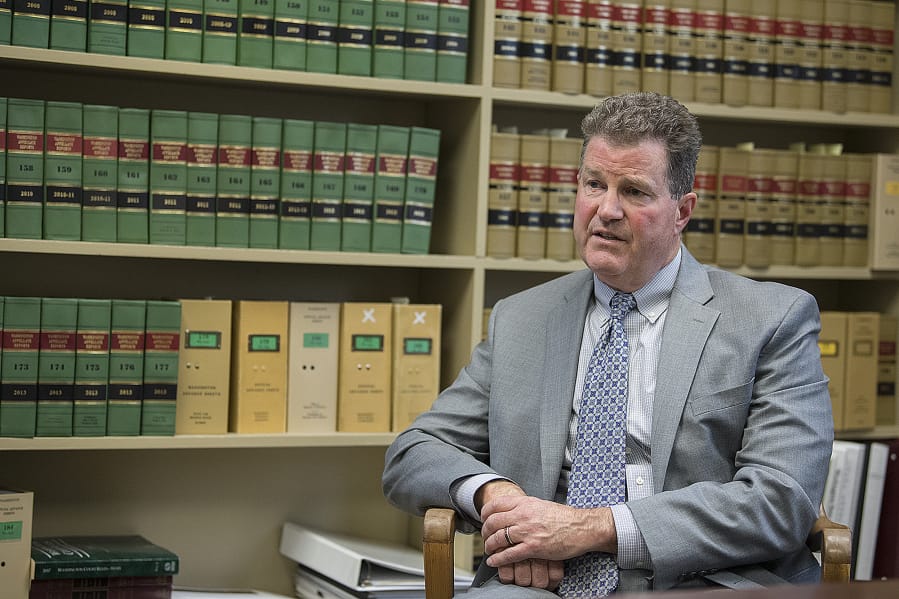The judge who set bail for a man who fatally shot his estranged wife in the parking lot of their children’s school, days after he was released from jail, says he feels horrible about what happened but that he made the best decision he could at the time.
“I just felt terrible,” said Judge John Fairgrieve, recalling when he learned of the shooting last week. He quickly rubbed his eyes as tears welled up — one tear spilling onto his left cheek.
In an interview Friday with The Columbian, from his office in the Clark County Courthouse, Fairgrieve talked generally about what factors go into determining bail, and why domestic violence cases are particularly tough to decide.
“It’s very difficult to predict what’s going to happen,” he said, and it’s hard to know someone’s motives when they violate a no-contact order — “if the nature is to inflict violence or continue forward with the relationship.”
On Nov. 26, Vancouver’s Keland Hill shot his wife, 35-year-old Tiffany Hill, and her mother, while they sat in a parked minivan at Sarah J. Anderson Elementary School in Hazel Dell. Three children were inside the vehicle but were physically unhurt.
Following a brief police pursuit, Keland Hill, 38, shot himself in the head at Padden Parkway and Andresen Road. He and Tiffany Hill were later pronounced dead. Tiffany Hill’s mother suffered injuries that were not life-threatening.
Eleven days earlier, Fairgrieve had raised Keland Hill’s bail from $75,000 to $250,000, following his Sept. 11 arrest for allegedly attacking his wife and repeatedly violating a domestic violence no-contact order. Deputy Prosecutor Lauren Boyd had requested bail be set at $2 million and that Keland Hill be electronically monitored if released.
When asked Friday if his decision weighs on him, Fairgrieve, who’s served on the bench since April 2015, said, “Oh, yeah, of course it does. For a judge, probably one of the worst things that can happen is when you make a decision to set bail, follow the guidance (from the Washington Supreme Court), the person makes bail and goes out and commits a violent crime. That is your worst nightmare.
“You look at what’s in front of you and make the best decision you can,” he continued. “The reality is, given the number of decisions you have to make, terrible things will happen, and that’s a tragedy.”
How bail works
Superior Court is governed by the rules of criminal procedure determined by the Washington Supreme Court; specifically, Rule 3.2 governs the assignment of bail.
Judges must consider the presumption of release in noncapital cases, even after probable cause is found. They look at whether a defendant is likely to commit a violent crime, interfere with the administration of justice or fail to appear at a future court hearing.
They must also consider a defendant’s financial status. However, the Supreme Court “doesn’t tell us what exactly we’re supposed to do in that regard,” Fairgrieve said. He interprets it as setting some degree of bail that a defendant can reasonably post.
In reaching a decision on bail, judges must also consider the nature of the crime and defendant’s criminal history, as well as any warrants or failures to appear. Much of that information is provided by the prosecution. Judges also hear the defendant’s ties to the community, such as family in the area, a job or residence, and weigh arguments from the defense. The judge then explains their decision on the record. Bail can also come with restrictions on travel, on weapons possession — including firearms — and on drugs and alcohol. There are also different levels of supervision, Fairgrieve explained.
Keland Hill was employed, had a local residence and minimal criminal history. He posted bail Nov. 21, court records show.
Fairgrieve said it’s difficult to know whether a defendant can make bail; there are too many unknowns.
“All I can say is, I try to follow the guidance and consider the factors and do so consistently, and that’s what I did in this particular case,” Fairgrieve said.
A too-common crime
Domestic violence is one of the most common crimes that come before the court, Fairgrieve said, along with drug and theft cases.
On an average day, Clark County Superior Court sees 20 to 40 defendants between the morning first appearance and arraignment dockets. Of those cases, five to 10 are domestic violence-related, he said. District Court sees even more cases, with fourth-degree assault, a gross misdemeanor, harassment and lower-level property crimes.
“In domestic violence cases, it’s pretty common for there to be history,” Fairgrieve said. It’s uncommon for a first-time domestic violence case to be a felony; there are usually prior convictions or violations of no-contact orders, he said.
Keland Hill had been arrested in Maryland and North Carolina for abusing his wife, but the cases had been dismissed, according to prosecutors.
“He had done this countless times,” Tiffany Hill wrote in a no-contact order petition. “He’s been arrested before for attempted murder against me in (North Carolina). He got me to drop the charges.”
Fairgrieve said it’s not uncommon for a victim of domestic violence to ask that charges be dropped. He’s had victims email him asking for the no-contact order to be rescinded. Family dynamics, particularly when the husband and abuser is the breadwinner, play a role.
“Victims of domestic violence are placed in an absolutely untenable situation,” Fairgrieve said. “They don’t necessarily want their relationship to end; they want the violence to end.”
Protection orders
Domestic-violence protection orders are automatically issued in criminal cases and are signed regardless of a defendant’s release. The no-contact order is also re-entered at the time of arraignment, Fairgrieve said. No-contact orders are issued to protect victims from harassment, intimidation and further violence.
Fairgrieve said he understands the notion that the order is simply a piece of paper; however, violating a protection order is a crime within itself.
“That’s criminal history against subsequent (crimes),” he said. Each time someone is convicted of a violation, it ratchets up the potential sentence.
“I’ll be the first one to say individuals who violate laws to begin with probably aren’t particularly impressed by a no-contact order,” Fairgrieve said. However, a defendant who’s felt the repercussions of violating a no-contact order may think twice before doing it again. “Hopefully, it will dissuade them in the future.”
Victims of domestic violence can also apply for a no-contact order outside the criminal system by submitting an affidavit describing the situation. A judge holds an “ex parte” docket every day, where they see three to 12 petitions. The court can issue a temporary domestic violence no-contact order. A hearing is set out 14 days, where the petitioner and defendant can present evidence. The judge then decides whether to extend the order, Fairgrieve explained.
In addition to a no-contact order filed on the day of her husband’s initial arrest, Tiffany Hill obtained a restraining order Oct. 4, seeking to bar him from their shared residence and from having any contact with her or their three children. She reported each time he tried to contact her over the phone or in person. She went to the Domestic Violence Prosecution Center to report additional contact. After an assessment, a Vancouver police detective classified her as being in extreme risk of being killed by Keland Hill.
Still, all of her efforts to seek help didn’t save her.
When asked if the judicial system failed Tiffany Hill, Fairgrieve said “that’s a loaded question.”
“It’s a tragedy this woman was killed, that Keland Hill killed his wife. It’s very concerning this event occurred,” he said. “I can’t answer (the question) in a way that would give it justice. There are too many issues involved.”




